The Mastermind Behind Bin Laden’s Escape Is Back—With His Own Taliban Army
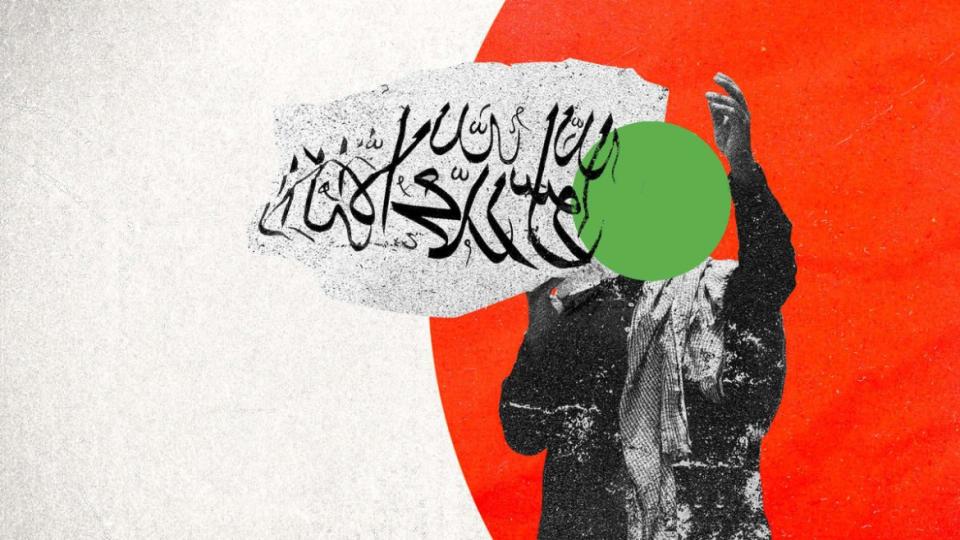
Anwar ul Haq Mujahid, a leader of Osama bin Laden’s former “Black Guard,” who helped plan and orchestrate his escape from intense U.S. bombing at Tora Bora in 2001 and whose underlings were sent to prison in Guantanamo Bay, is back in charge of Taliban fighters across eastern Afghanistan, The Daily Beast has learned.
“Anwar ul Haq Mujahid, the son of Younus Khalis, has returned with hundreds of vehicles and thousands of supporters to his family’s seat of power and to a heroic welcome in Jalalabad,” said a recently deposed senior Afghan intelligence official. “Everyone who worked closely with al Qaeda in 2001 is back in his entourage, which arrived by air from Doha to help establish the new government in Kabul and then travelled overland this past week from Kabul to Jalalabad. He is now in charge of both Taliban and foreign fighters in Eastern Afghanistan, including a Chechen contingent.”
A senior U.N. political official and a Swiss-Italian journalist who was on the ground in the province confirmed the return of Anwar to Jalalabad last Friday as well as his role as a military commander. According to sources, the revered leader of the “Tora Bora Front” was seen daily holding court in his clan’s sprawling reception hall on plush Afghan carpets as hundreds of fighters and villagers streamed to his home to listen to his wisdom and advice on the implementation of Sharia law. Another one of Bin Laden’s former Black Guards, Amin ul Haq, also recently made a triumphant return to Jalalabad, as first reported by The Long War Journal.
How America Made Osama Bin Laden’s Dream Come True
The sources said the two Black Guard commanders—Anwar, a pensive intellectual and Amin, an ebullient bully—are exerting newfound authority from their respective fiefdoms in the orange groves outside of the lowland Afghan city of Jalalabad. Their very presence in Jalalabad, bin Laden’s old hometown, is a testament to the U.S. government’s misguided efforts to eliminate terror in Afghanistan—and across parts of the Middle East. Sources told The Daily Beast that Afghans passing through Jalalabad from Kabul and seeking refuge in neighboring Pakistan, particularly Hazara minorities, reported heavy harassment and intimidation from soldiers under the command of both men this week.
Anwar ul Haq Mujahid, who managed bin Laden’s meticulously-planned retreat from Jalalabad into Tora Bora in November 2001 as documented in a U.S. Senate Foreign Relations Committee investigation in 2009, and Amin ul Haq, who laid the groundwork for the battle of Tora Bora and helped usher the Saudi sheikh to safe haven in Pakistan for a decade, are enforcing unpopular Sharia laws and openly praising their former al Qaeda associates, according to Rossi.
The influence of the former Black Guard contingent in the Taliban’s new power scheme comes as U.N. Secretary-General Antonio Guterres used his personal influence to garner international pledges of over a billion dollars Monday to help bail out the Afghan Taliban government and the broader Afghan public from the nation’s mounting humanitarian crisis. Meanwhile, U.S. Secretary of State Antony Blinken sought to reassure American senators this week that he is liaising with the U.N. to “be sure U.S. assistance goes to the people of Afghanistan,” but not to the Taliban, insisting carefully that the Taliban’s new government “includes many key members who have very challenging track records,” and that the U.S. was guarding against the “re-emergence” of international terrorism in Afghanistan.
The two leaders arrived separately a week apart, with Anwar arriving most recently into Jalalabad. Both men have hundreds of fighters at their command, even as some Afghans expressed anger that their former tormentors were allowed to shuttle out of Pakistan where they sought refuge after the U.S. invasion. Pakistan’s intelligence service (ISI) has also been long accused of harboring bin Laden in a guarded compound close to their preeminent military academy in Abbottabad until he was finally killed in an unannounced U.S. Special Forces raid in 2011.
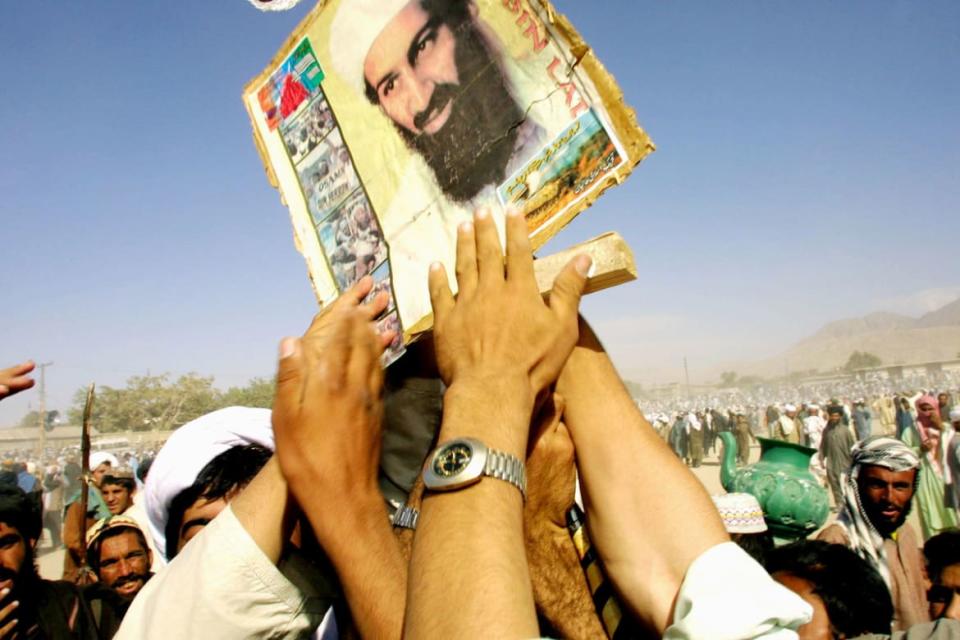
Pro-Taliban supporters hold up a poster of Osama bin Laden during a rally October 1, 2001 in the town of Quetta, Pakistan.
The participation of bin Laden’s core of former Afghan supporters—after al Qaeda’s congratulatory message to the Taliban on their August victory and the return to jihadist airwaves this week of bin Laden’s right-hand man, Egyptian Dr. Ayman al-Zawahiri—is a sign that the Taliban leadership wants to have its cake and eat it too in the town where bin Laden’s wives once hung his underwear out to dry. The Taliban will continue to deny they are still allied with al Qaeda, said Afghan, U.S. and UN sources, while raking in assistance from the West as well as from less-known wealthy backers in the Middle East.
How Al Qaeda Escaped Afghanistan and Lived to Fight Another Day
“Al Qaeda remains in Afghanistan and closely associated with the Taliban: These are facts documented by the U.N. and others,” former U.S. Ambassador to Afghanistan Ronald Neumann, president of the American Academy of Diplomacy, told The Daily Beast. Neumann added that, “Al Qaeda branches as far away as North Africa are celebrating the Taliban victory in Afghanistan.” A special report by the U.N.’s Support and Sanctions Monitoring Team released before the U.S. military’s full retreat on Aug. 30, while warning of a likely Taliban takeover, also determined that the Taliban is “closely aligned” with al Qaeda, adding that the allied groups have also strengthened military and financial bonds through marriage.
The role of the returning Eastern Shura leaders in aiding and abetting al Qaeda is not nearly as well understood as the actions of the Taliban’s younger Interior Minister and suicide bombing mastermind Sirajuddin Haqqani. The ties of the two older men go back decades. Anwar and Amin are two hens that helped lay the proverbial golden eggs for bin Laden and his plans to take down the World Trade Center towers. There may be no greater Afghan bond with al Qaeda than that claimed by the Pashtun clan of the deceased Younus Khalis, the father of Anwar ul Haq Mujahid, who is fluent in Arabic, and valued by the Taliban as a successful fundraiser.
Anwar, who for years ran the multimedia “Tora Bora Front” from a secret base in Pakistan told Swiss-Italian reporter Filippo Rossi that bin Laden “sought sanctuary with us in 1996, and as our guest within our Pashtunwali code of honor we were obligated to protect him. He was a Holy Warrior, like us, and a friend.” The thin, bespectacled, gold-turbaned Pashtun leader’s calm demeanor contrasts sharply with the more boastful persona of his associate Amin ul Gul, often referred to in the past—erroneously—as “bin Laden’s bodyguard.”
Reporting out of Jalalabad as a journalist amid intense U.S. bombing in November and December 2001, I was able to observe and document the behavior of both these men towards al Qaeda. Early on, my interpreter penetrated the Khalis family compound and heard the clan’s patriarch Younus Khalis state that the U.S. would surely fail to conquer Afghanistan and take down its stated prey. As B-52s circled in figure eights overhead, a few dozen U.S. servicemen assembled nearby to work as “spotters” for the air power provided to a feuding Afghan contingent of the Taliban’s sworn enemies. The efforts led by these Afghan guns-for-hire, as the U.S. public learned in retrospect, were part and parcel of a flawed approach to taking down the world’s most wanted terrorist “dead or alive” as President George W. Bush had earlier vowed.
Hasty preparations for an escape to the White Mountains began two days before the fall of Kabul on Nov. 12 when bin Laden rallied his forces at a sumptuous kebab feast at the Taliban’s then-intelligence headquarters in Jalalabad.
Bin Laden, dressed in loose gray Afghan clothing and wearing his signature camouflage jacket, spoke in soft, polite tones to assembled followers, handing them all cash envelopes worth tens of thousands of dollars, a down payment on his own eventual getaway. In Jalalabad, al Qaeda’s leadership, in close consultation with Anwar ul Haq Mujahid and bin Laden’s personal guard Amin ul Haq, laid out the group’s secret plans to move into the cave and bunker complex known as Tora Bora. The burly Amin ul Haq had earlier helped prepare the fortified redoubt for bin Laden’s arrival.
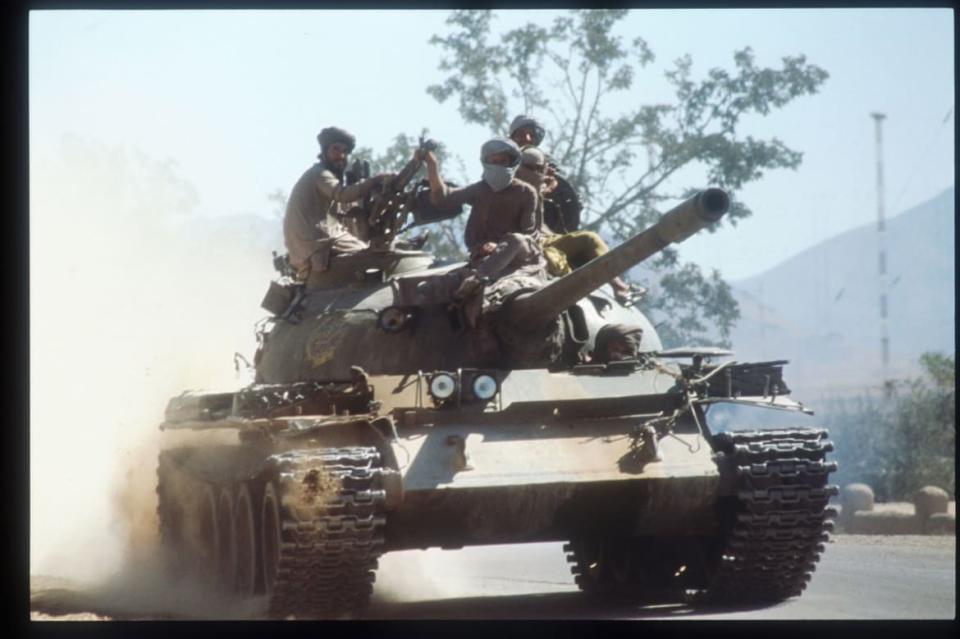
Members of the Taliban army ride atop a tank October 15, 1996 near Kabul, Afghanistan.
Cradling a pug-nosed Kalakov machine gun, Bin Laden stood with Anwar ul Haq Mujahid amid an immense convoy after the feast day at 9:30 pm. Witnesses said the entourage began its hasty retreat with bin Laden riding alongside his Afghan hosts in a hatchback Corolla. The fleeing al Qaeda and Taliban fighters snaked their way down a bumpy dirt road that ran through old battlefields and dusty villages and into the Tora Bora base. Anwar’s own deputy Awol Gul boasted to us on Nov. 25 that “the Americans can bomb all they want, but they’ll never catch Osama.” (Gul, whose lawyer later petitioned me to identify his client as a small player, would die without a trial after 10 years in the U.S.-run Guantanamo Bay prison.)
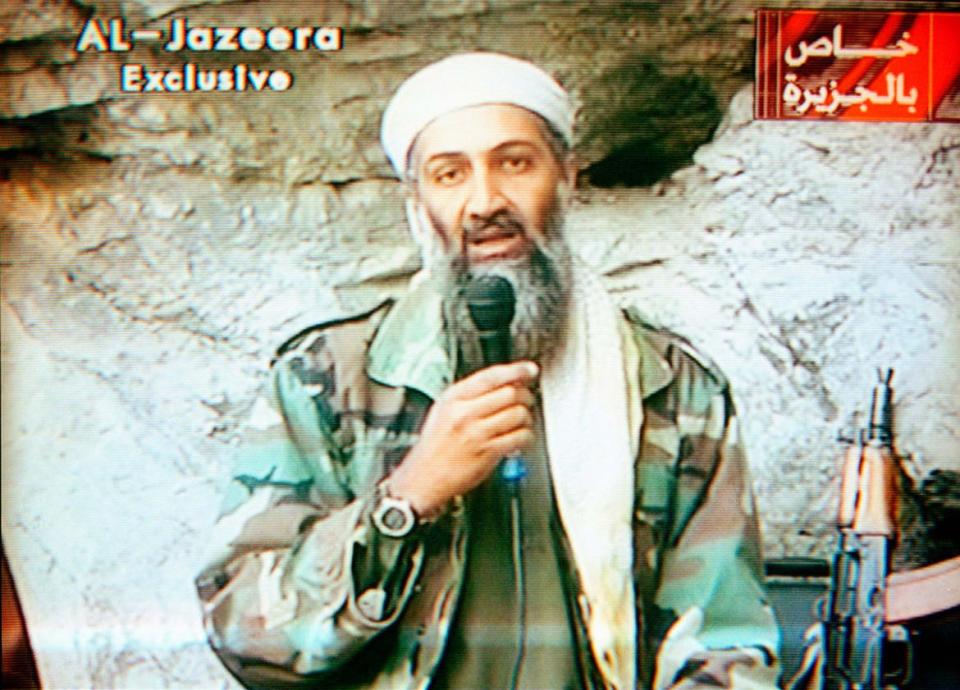
Osama Bin Laden appears on Al-Jazeera Television praising the attacks of September 11th.
Though bin Laden had earlier vowed that he would fight to the death, his retreat was soon being planned from within the caves of Tora Bora, where his own Saudi chef later confessed that he had cringed in fear from intense bombing while cooking for bin Laden and finally fled himself without his boss’ permission. Bin Laden, taking heed, bid his own troops farewell on Nov. 26. As quickly as he had arrived to address his troops, bin Laden vanished into the scraggly pine forests led by his bodyguard Amin ul Haq, whose role in the getaway would earn him the affections and respect of Taliban followers in Afghanistan and Pakistan, where he also would be briefly “jailed” between 2008 and 2011.
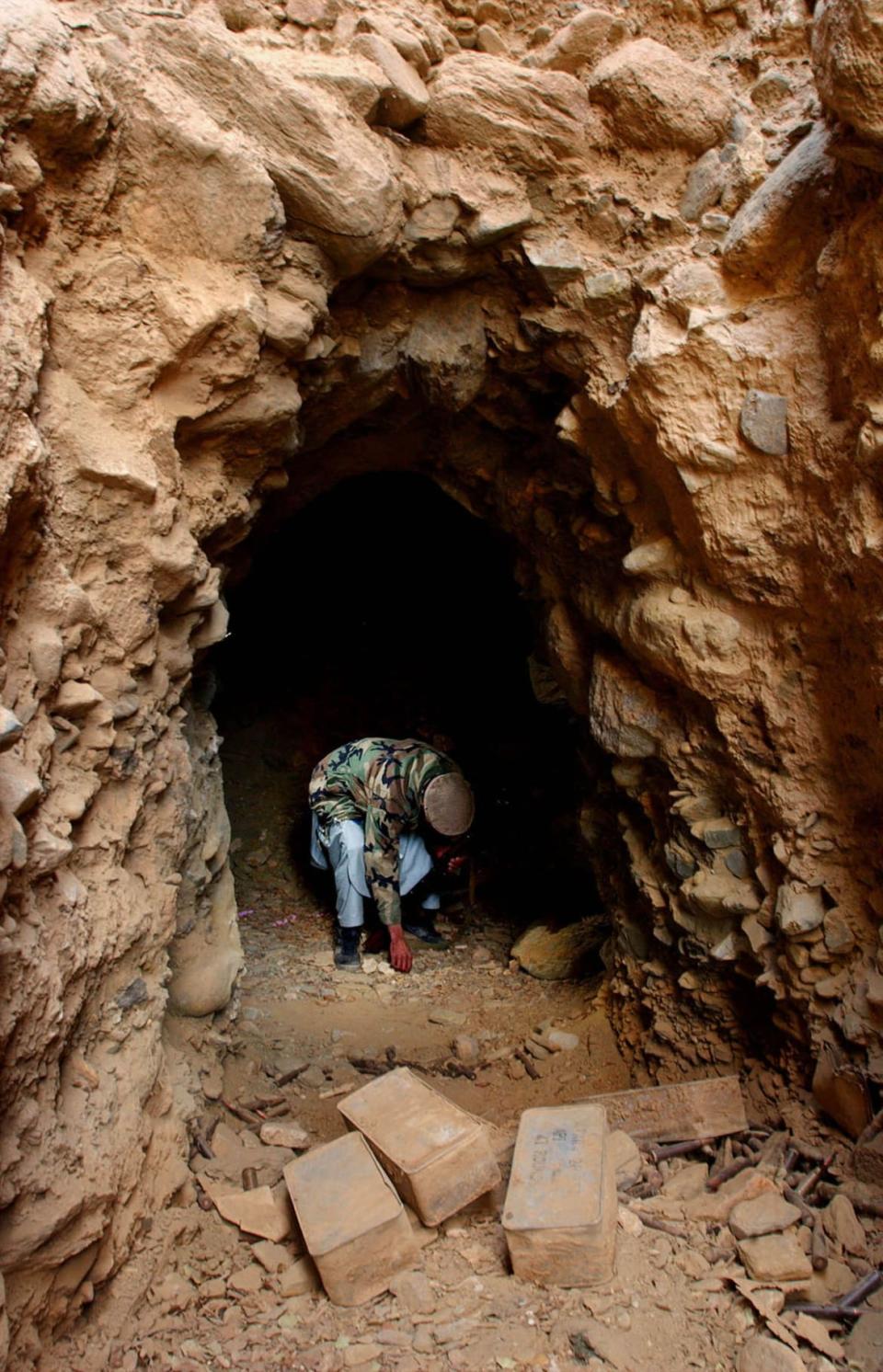
A mujahadeen soldier picks up an item at the entrance to a former Al-Qaeda cave December 24, 2001 in Tora Bora, Afghanistan.
Bin Laden, according to several fighters and a close Saudi associate, later radioed back to Tora Bora’s central nerve center, urging his followers to keep fighting, an effort that would buy him time for a trek out of the White Mountains through the snow.
Justice, of course, was never served in the cold wintry air beneath an armada of U.S. air power. Nearly three dozen U.S. Special Forces, their faces wrapped in black and white bandanas, laser target-designators in hand, looked on in dismay as the Afghans, whom the CIA had paid excessively to “hunt” bin Laden, failed to corner their man.
The War on Terror Turned Out to Be a War on Ourselves
Over this past weekend, another former U.S. ambassador and commanding general in Afghanistan, Karl Eikenberry, told CNN’s Jake Tapper that he believed Tora Bora to be a clearly missed opportunity that could have—if only it had been done properly—helped to rapidly wind down the $1.5-2 trillion U.S. misadventure in Afghanistan long before it would morph into America’s “Forever War.” Like other senior U.S. commanders, who have spoken wistfully of the failures at Tora Bora, Eikenberry, whom I served under in the State Department at the U.S. Embassy, insisted the key to getting bin Laden would have been to insert U.S. ground forces to surround al Qaeda and seal the mountain passes.
The aftermath of the multi-billion-dollar failure at Tora Bora, abetted by the leading lights of the Eastern Shura with Anwar and Amin in the vanguard, has left the Afghan public today groaning under the whims of religious ideologues and domestic terrorists. Across the Middle East, jihadists are assembling with renewed zeal to plan their own next adventures into Afghanistan and, in some cases, seize Afghan wives.
Despite assurances from the U.S. secretary of state, many analysts believe there is little hope of helping the broader Afghan public as long as the Taliban remains in charge.
“The international donor community is taking a huge risk assuming that the Taliban will distribute aid in a neutral, need-based way,” Jonathan Terra, a political scientist, former State Department official in Afghanistan, and conflict analyst for NATO, told The Daily Beast. “They are a brutal, self-interested, mostly ethnic Pashtun Pakistani proxy government whose leaders were able to seize power only through financial support, sanctuary and the backing of Pakistani armed forces.”
Many Afghans still on the ground insist, however, that assistance to the public needs to continue. “Our primary health care system, which saw immense improvements over the last twenty years, was being financed by the World Bank, but has now been defunded,” Dr. Mir Dost Mohammad Zadran, an urologist and transplant specialist who heads the Foreign Afghan Medical and Dental Doctors’ Association (FAMDA) in Kabul, told The Daily Beast. “We need the world’s help here in Afghanistan today and as soon as heavenly possible.”
Get our top stories in your inbox every day. Sign up now!
Daily Beast Membership: Beast Inside goes deeper on the stories that matter to you. Learn more.

 Yahoo Finance
Yahoo Finance 